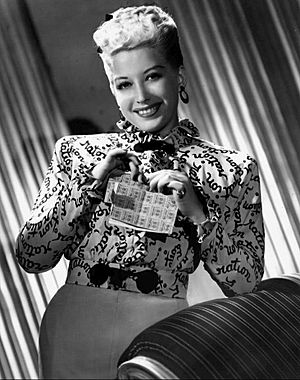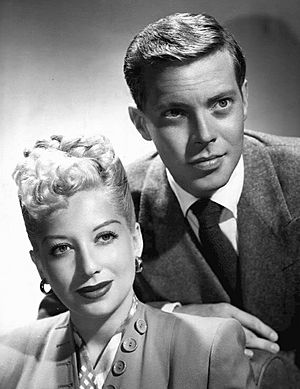Helen Forrest facts for kids
Quick facts for kids
Helen Forrest
|
|
|---|---|

Helen Forrest in 1945.
|
|
| Background information | |
| Birth name | Helen Fogel |
| Born | April 12, 1917 Atlantic City, New Jersey, U.S. |
| Died | July 11, 1999 (aged 82) Los Angeles, California, U.S. |
| Genres | |
| Occupation(s) | Singer |
| Instruments | Vocals |
| Years active | 1934 – 1991 |
| Associated acts |
|
Helen Forrest (born Helen Fogel, April 12, 1917 – July 11, 1999) was a famous American singer. She was known for her beautiful voice in traditional pop and swing music. Helen was the main female singer for three of the biggest "big bands" during the Swing Era. These bands were led by Artie Shaw, Benny Goodman, and Harry James. Because of this, she became known as "the voice of the name bands."
Contents
Early Life and Music Dreams
Helen Forrest was born in Atlantic City, New Jersey, on April 12, 1917. Her parents, Louis and Rebecca Fogel, were Jewish. Her father passed away when Helen was a baby, so her mother raised her. Helen had three older brothers named Harry, Ed, and Sam.
When Helen was a teenager, her family moved to Brooklyn. She didn't get along well with her stepfather. At 14, Helen's mother let her live with her piano teacher, Honey Silverman, and her family. Honey noticed Helen's amazing singing talent and told her to focus on singing instead of piano. Helen was so excited to become a singer that she left high school to follow her dream.
Starting Her Singing Career
Helen went back to Atlantic City and began singing with her brother Ed's band. Soon after, she returned to New York City. There, she visited music publishers and auditioned for a 15-minute spot on a local radio show. Around this time, someone suggested she change her last name from "Fogel" because it sounded "too Jewish."
In 1934, when she was 17, Helen started singing for WNEW radio in New York. She also performed for WCBS, where she was known as “Bonnie Blue” and “The Blue Lady of Song.” Eventually, she found a singing job at the Madrillon Club in Washington, D.C., where she performed for about two years.
Singing with Big Bands (1938–1943)
Joining Artie Shaw's Band
After seeing Helen perform, bandleader Artie Shaw asked her to join his band on tour. He was looking for a new singer because Billie Holiday had left. Helen was hired in 1938. For a short time, both Helen and Billie Holiday worked with Shaw's band. In some places, Black performers had to stay off stage until it was their turn to sing. When Helen found out about this, she said she would also stay off stage until she sang, just like Billie Holiday.
Helen recorded 38 songs with Shaw's band. Two of her biggest hits with them were "They Say" and "All the Things You Are." During her time with Artie Shaw, Helen Forrest became very popular across the country. In November 1939, Artie Shaw decided to break up his band.
Singing with Benny Goodman
Helen then joined Benny Goodman's band in December 1939. With Goodman, she recorded many famous songs, including the hit "The Man I Love." Helen made 55 studio recordings with Goodman.
She once said that Benny Goodman was the most demanding band leader she sang for. She also mentioned that Goodman would often play his clarinet behind her while she sang, which sometimes made her feel crazy. Goodman was known for being a perfectionist and hard to work with. In August 1941, Helen left his orchestra because she felt overwhelmed and needed a break. After leaving Goodman, Helen briefly recorded with Nat King Cole and Lionel Hampton.
Success with Harry James
In 1941, Helen approached Harry James and offered to work for him. She had one condition: she wanted to sing more than just one part of a song. Even though James was looking for a singer who was more focused on jazz, he let Helen audition. The band voted her in, and she was hired.
Helen later explained that Harry James was wonderful. He agreed to let her sing full songs, not just short parts. She felt that while Artie and Benny treated her like another instrument in the band, Harry gave her the right kind of music that fit a singer. He built his arrangements around his trumpet and Helen's voice, making the songs warmer and slower. This allowed Helen to be the star of the songs.
With the Harry James Orchestra, Helen recorded some of her most popular songs. These included "I Had the Craziest Dream" in 1942 and "I Don't Want to Walk Without You" in 1941. In 1942, Helen also appeared with the Harry James Band in the Hollywood movie Springtime in the Rockies, which starred Betty Grable. In both 1942 and 1943, Helen Forrest was voted the best female singer in the United States in the Down Beat poll, a very important music survey.
Solo Career and Later Years (1944-1960s)
Helen Forrest left Harry James in late 1943 to start her own solo career. She felt that three years with a band was enough. She signed a recording contract with Decca and co-starred with Dick Haymes on The Dick Haymes Show, a radio show on CBS from 1944 to 1947. Helen's first song with Decca, "Time Waits For No One," reached second place on the Hit Parade, and her radio show was very popular.
Dick Haymes also recorded with Decca, and from 1944 to 1946, he and Helen recorded 18 duets. Ten of these songs reached the Top Ten on the music charts. Some of their most successful duets were "Long Ago and Far Away," "It Had To Be You," and "I'll Buy That Dream." In 1944, Helen also appeared in the movie Bathing Beauty with Esther Williams and Harry James's orchestra. She also appeared in the film Two Girls and a Sailor. During the late 1940s, Helen performed as the main act in theaters and clubs.
In 1955, Helen's mother passed away. That same year, Helen joined Harry James again in the studio to record a new swing album called Harry James in Hi-Fi, which sold very well. By the end of the 1950s, Helen's solo career slowed down as rock and roll music became more popular.
After recording less in the 1950s, Helen sang with Tommy Dorsey's orchestra, led by Sam Donahue, in the early 1960s. Helen continued to make occasional records and perform in concerts. She was performing at Lake Tahoe with Frank Sinatra Jr. in 1963 when he was kidnapped.
Later Years and Retirement (1970s-1990s)
During the 1970s and 1980s, Helen performed in supper clubs on tours that celebrated "big band nostalgia." She appeared with Harry James and Dick Haymes. In 1977, Helen, James, and Haymes had a reunion on The Merv Griffin Show on television. This led to a touring show called The Fabulous 40s in 1978, and then a similar show called The Big Broadcast of 1944 in 1979.
In 1980, Helen had a stroke, but she recovered and continued performing and recording. Her autobiography, I Had the Craziest Dream, was published in 1982. It was dedicated to her only son. In 1983, Helen released her final album, called Now and Forever. She also starred in a stage show called A Tribute to Dick Haymes with Vivian Blaine and Margaret Whiting.
Helen faced many challenges in her life, including a difficult childhood and frequent illnesses. Despite this, she loved her music and kept singing until the early 1990s. At that time, rheumatoid arthritis began to affect her vocal cords, forcing her to retire. Helen also had scarlet fever when she was young, which caused some hearing loss. Her hearing got worse as she got older, but she could still perform her old songs because she remembered the notes.
Death and Legacy
Helen Forrest passed away on July 11, 1999, from congestive heart failure at the Motion Picture & Television Country House and Hospital in Woodland Hills, Los Angeles. She was 82 years old. She was buried at Mount Sinai Memorial Park Cemetery in the Hollywood Hills, Los Angeles.
At the peak of her career, Helen Forrest was one of the most popular female singers in the United States. Because of her work with the bands of Artie Shaw, Benny Goodman, and Harry James, she is known as "the voice of the name bands." Many people consider her the best female singer of the swing era. AllMusic describes her as a performer with an amazing ability to express song lyrics and a great interpreter of music. IMDb said that Helen brought a sweet "girl-next-door" quality to her songs through her warm voice and clear, emotional way of singing. George Simon, a writer, said Helen was "a wonderfully warm and natural singer."
Over her career, Helen Forrest recorded more than 500 songs. In 2001, she was honored by being included in the Big Band and Jazz Hall of Fame.
Family Life
Helen Forrest was married and divorced three times. In 1960, she and her third husband, Charles Feinman, had her only son, Michael Forrest Feinman. Michael lived in southern California until his passing in 2014.
Helen's Own Words
Helen Forrest once shared her thoughts about her career:
"I live for today, but it is nice sometimes to look back to yesterday. We did not know that we were living through an era - the Big Band Era - that would last only 10 years or so and be remembered and revered for ever...it's hard to believe, but the best times were packed into a five-year period from the late 1930s through the early 1940s when I sang with the bands of Artie Shaw, Benny Goodman, and Harry James. The most dramatic moments of my life were crammed into a couple of years from the fall of 1941 to the end of 1943. They seem to symbolize my life...that was when the music of the dance bands was the most popular music in the country, and I was the most popular female band singer in the country and Harry had the most popular band in the country. It didn't last long, but it sure was something while it lasted. Everyone should have something like it at least once in their lives. I'm grateful I did." - Helen Forrest (around 1982)
See also
 In Spanish: Helen Forrest para niños
In Spanish: Helen Forrest para niños
 | Selma Burke |
 | Pauline Powell Burns |
 | Frederick J. Brown |
 | Robert Blackburn |


